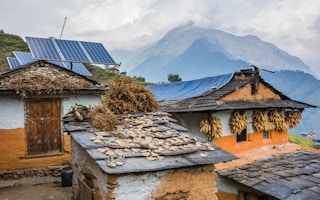The need for affordable energy remains unmet in large parts of the world. According to the International Energy Agency (IEA), a Paris-based intergovernmental organisation, 770 million people were living without access to electricity in 2019. This was a 10 per cent improvement over the 860 million people who could not switch on a light within their homes the year before.
To continue reading, subscribe to Eco‑Business.
There's something for everyone. We offer a range of subscription plans.
- Access our stories and receive our Insights Weekly newsletter with the free EB Member plan.
- Unlock unlimited access to our content and archive with EB Circle.
- Publish your content with EB Premium.
That said, Covid-19 threatens to slow the pace of progress in energy security, particularly for the poor. According to the IEA, “estimates indicate that the population without access to electricity could increase in 2020 for the first time since 2013.” Growing inequality between developing and developed economies has put the former on the back foot. Across Africa, poverty rates are expected to more than double as a result of the pandemic, reversing years of development gains.
Even in countries such as India, which has seen a significant commitment by the government and private sector to enhancing energy supply, particularly electricity and cooking gas, demand continues to outstrip supply. We must acknowledge and respond more actively to the legitimate aspirations of people to not just “consume” electricity for healthier and happier lives but use it to produce goods and services that enhance economic wellbeing and build resilient communities.
Rural electrification in developing nations is a critical component to their growth stories, boosting economic independence, increasing school enrollment, and enhancing job opportunities. This is not least illustrated by the fact that according to the World Bank, lack of electricity can reduce a person’s chances of finding a job by 41 per cent. The appeal of local, clean energy solutions is even more compelling when one takes into account the cost of connecting remote communities to the grid, and the unreliability of the grid in countries where energy sources are tenuous.
Improved access to energy should not be considered a problem to solve. With the planet on the brink of a climate crisis, it must be seen as an opportunity to meet social, environmental and indeed, economic objectives.
The abundance of renewable sources of energy at our disposal provides the chance to build back better. But efforts aimed at decarbonising energy supply must go beyond the relatively narrow boundaries of supply-side innovation and the delivery of clean energy solutions. To decarbonise and realise social development objectives at scale, we must also decentralise and equip local service providers with the tools to deliver solutions that respond to people’s needs and aspirations, creating demand where none exists and employing processes in which they are able to create environmental and social value through not just the sale of kilowatt-hours but value-added services as well.
Recent innovation in materials, production systems and business models, aided by digital technology, indicate how an alternate growth trajectory can be put in place for positive, sustainable impact at scale. Supply chains that transport electricity across vast distances and through a large number of intermediaries are more than likely to get stretched and eventually, broken — a phenomenon that we have seen glimpses of during the pandemic.
As big brands would continue to be an asset for both large corporations and small entrepreneurs, franchising models would be the most competitively placed to deliver solutions at scale; particularly to the hundreds of millions of households that still have unmet needs. Corporations could use their might to help the local producer, possibly a franchisee, create competitive value propositions for their customers.
In such a scenario, one must question where new ideas and solutions will be sourced from. Will innovation take place within the four walls of corporate R&D outfits and government-funded research laboratories? Or will the innovation process be located within the context where solutions are needed the most? This is where local entrepreneurs and innovation have a significant advantage.
Take Clinela Solar, a Uganda-based social enterprise and one of the runners-up of the 2021 SEED Low Carbon Awards, which identify, celebrate and scale the most innovative and locally-led enterprises in sustainable development across emerging economies. Clinela Solar exemplifies the importance of leveraging local insights and rural electrification to build a product with wide-ranging applications. It provides medical lighting solar bags for off-grid communities which help to reduce loss of life during childbirth. Clinela Solar’s proximity to customers, environmental and social goals and well as entrepreneurial zeal inevitably result in breakthroughs that are of considerable value and deliver multiple triple-bottom-line benefits.
Now, more than ever before, people and our planet need ecosystem builders who come together and go beyond the pursuit of narrow organisational goals to build pathways that translate innovation into impact at scale. Uniting these fragmented pockets of innovation and entrepreneurship can inform more widescale approaches to rural electrification strategies across the developing world. Harnessing existing solutions provides the chance to act more decisively, avoiding cumbersome grid-connected, nationwide energy policies in favour of an agile community focus, bringing power faster to those who need it most.
Shrashtant Patara is CEO of The Society for Technology and Action for Rural Advancement (TARA), and juror of the 2021 SEED Awards.


















